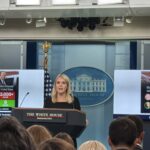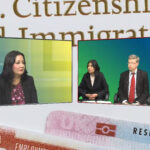Democratic candidate Amy Roma, running in the special election for Virginia’s 11th Congressional District to fill the vacancy left by the late Congressman Gerry Connolly, underscored the importance of deepening partnerships between the United States and South Asian countries.
In an exclusive interview with South Asian Herald on June 23, 2025, Roma stated, “Right now, some of the fastest growing economies in the world are in South Asia. There’s a huge economic opportunity for the US to partner with South Asian countries in order to further both diplomatic relationships, but also for economic and strategic purposes as well.”
Roma, a lawyer by profession, noted that strategic partnerships would not only bolster U.S. job creation, open new markets, and reinforce global security, but also benefit the economies of South Asian nations. Drawing from her ongoing work in the energy sector, she discussed how the US can work with South Asian countries on promoting clean energy that also creates jobs for the US and at the same time helps with the economic growth in the South Asian countries.
Roma maintained that these issues are deeply “interconnected,” and that it is essential for political leaders to understand.
A long-time resident of Vienna, Virginia, Roma also praised the contributions of the South Asian American community, describing them as “absolutely immense,” and a clear asset to her district and the country. “I mean, I can see it happening every day. I can see it in the federal workforce,” she said. Virginia’s 11th District includes much of Fairfax County and the City of Fairfax.
Highlighting the entrepreneurial spirit of many South Asian Americans, Roma advocated for expanding access to small business loans, grants, and federal contracting opportunities. She noted that reforming and streamlining the Small Business Administration’s loan application process would eliminate bureaucratic barriers. Her background in finance and her MBA, she added, would allow her to effectively address these challenges and support the local economy.
On immigration, Roma stressed the urgent need for reform and modernization to address long-standing backlogs that disproportionately affect South Asian families. She advocated for eliminating per-country caps, clearing the green card backlog, expanding H1B protections, and restoring work authorizations for spouses.
“Like these are all things that could significantly benefit the South Asian population in our local community. And those are all things that I would like to work with them on, and things that I would focus on in Congress,” she said.
Roma criticized the current state of immigration enforcement and the broader legal system. She noted that the biggest problem that the United States is facing is that “the rule of law is not being followed, and it’s not a logical approach” adding “I’ve done significant work on immigration issues over the years. I’ve gone to the southern border, I’ve worked with our immigrant community. I defended asylum cases in immigration courts. I can tell you firsthand that our immigration system is fairly broken.”
Calling for adequate resources to reduce visa processing delays and reunite families, Roma firmly rejected fear-based immigration enforcement tactics. “That does not involve having ICE officials round up people and terrorizing the immigrant community in order to try to scare them,” she stated.
Roma said she is running for Congress because her two-decade career has been focused on “solving really big problems.”
“At a time when our democracy is under threat and our economy is in transition, we need experienced leaders who can deliver results, not just sound bites and actually get things done,” she said.
As such, she reflected on her extensive pro bono humanitarian support, including helping to evacuate over 500 people – women, girls, and U.S. military allies who were at risk – from Afghanistan following the Taliban’s return to power.
Roma recounted how she became involved in those efforts after a neighbor, a Navy SEAL, asked for help evacuating his former translator from Afghanistan.
“My initial reaction was, I don’t know what I can do to help but let me see. So, I started making some phone calls, and it turns out I was able to help,” Roma said. “The lesson that I learned from that experience is that in times of crisis, you need to find the people who see the bigger mission, the bigger human rights mission, and the bigger patriotic mission.”
In the early stages of the COVID-19 pandemic, Roma also played a key role in securing over a billion pieces of Personal Protective Equipment (PPE) for frontline workers when government efforts lagged. She has testified before Congress on clean energy transitions and their impact on economic development, national security, and affordability.
Roma’s campaign is focused on four central issues: “Economic Prosperity, National Security, Protecting Democracy, and Safeguarding Our Communities.” When asked about why these issues are important to her, she warned that the country is witnessing increasing threats to democratic institutions, asserting that the current administration has eroded protections for individuals—from access to healthcare to immigration rights.
Underscoring the significance of economic well-being she said “When we have a strong economy, everybody can prosper. And we have policies that are being put in place that hurt our economy, like the tariffs being an example. Gutting our federal workforce is another example,” she said.
On the national security front, she expressed concern that the United States’ global standing has declined under the current administration. “People are losing their trust in our country, and that destabilizes the entire global climate in which we operate, which is a national security issue,” she emphasized.
Addressing the Trump administration’s strikes on Iran’s nuclear facilities, Roma stated, “Iran should not get nuclear weapons, and the tools by which we should prevent Iran from getting nuclear weapons is diplomacy under the Nuclear Nonproliferation Treaty.”
She pointed out that an agreement had existed during the first Trump administration that aimed to prevent Iran from obtaining nuclear weapons, but Trump “ripped” it up. According to her, although he announced he would seek a “diplomatic approach” he failed to do so and instead resorted to military action.
“There were other tools available that our President chose to ignore, and at this point, we need to prevent the further destabilization of the Middle East. Right now, it’s a very delicate region that can escalate into an all-out war, including drawing America into the war, if we don’t proceed carefully,” she added.


![Rb2sv7aF-1[1].jpg](https://southasianherald.com/wp-content/uploads/2025/06/Rb2sv7aF-11.jpg-1170x780.jpeg)



